初高中衔接 英语句子成分分析和句子类型 课件(共67张PPT)
文档属性
| 名称 | 初高中衔接 英语句子成分分析和句子类型 课件(共67张PPT) | 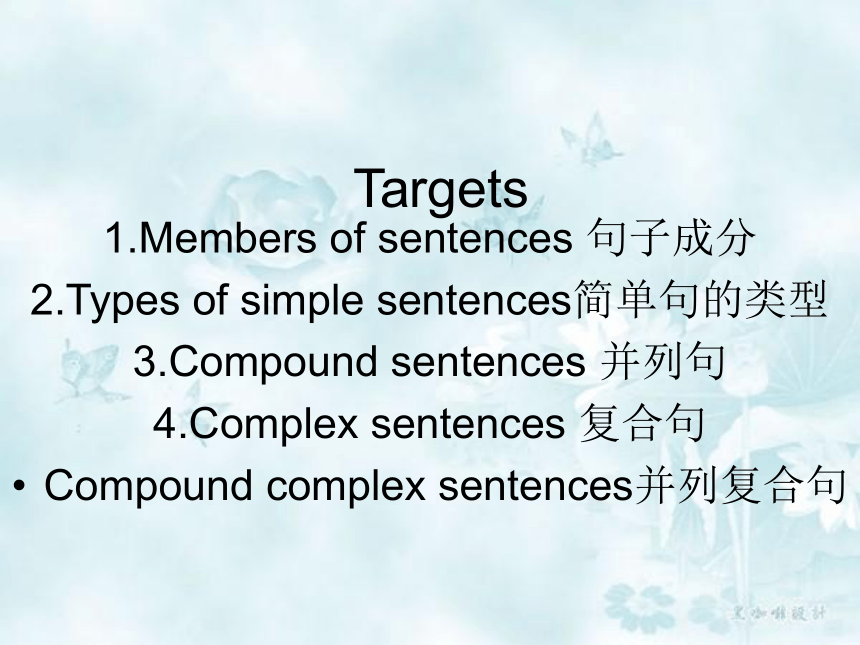 | |
| 格式 | ppt | ||
| 文件大小 | 2.5MB | ||
| 资源类型 | 教案 | ||
| 版本资源 | 人教版(2019) | ||
| 科目 | 英语 | ||
| 更新时间 | 2024-09-16 10:23:20 | ||
图片预览


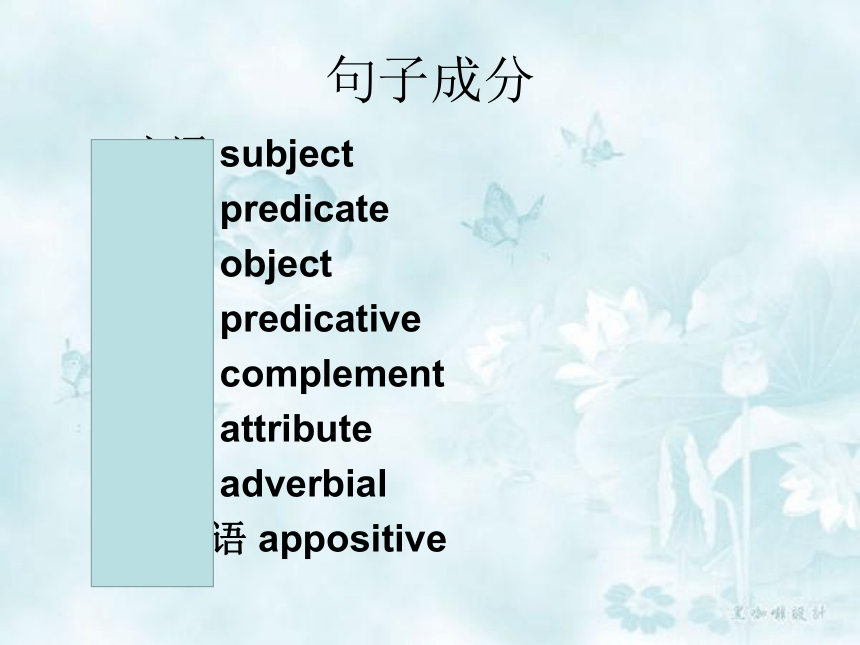
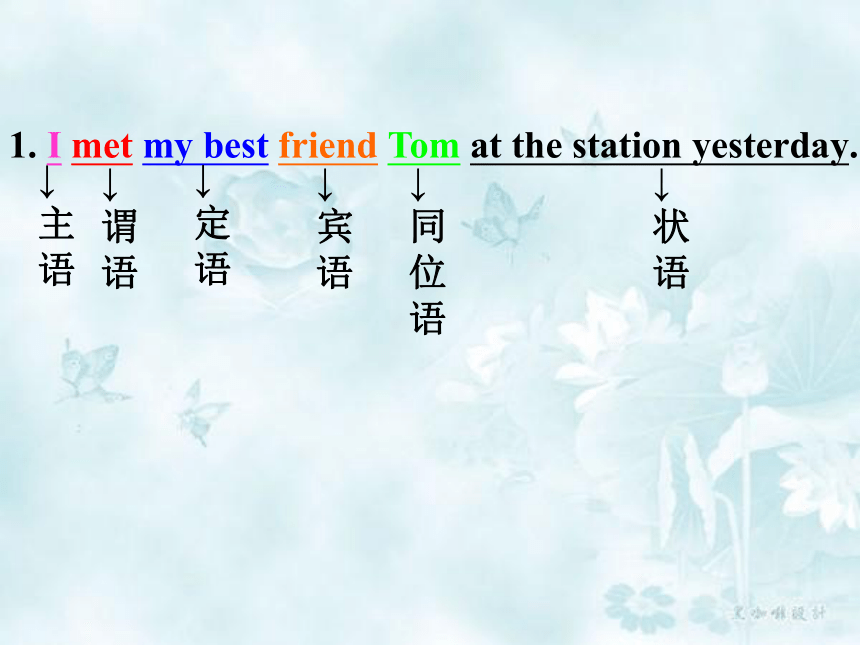
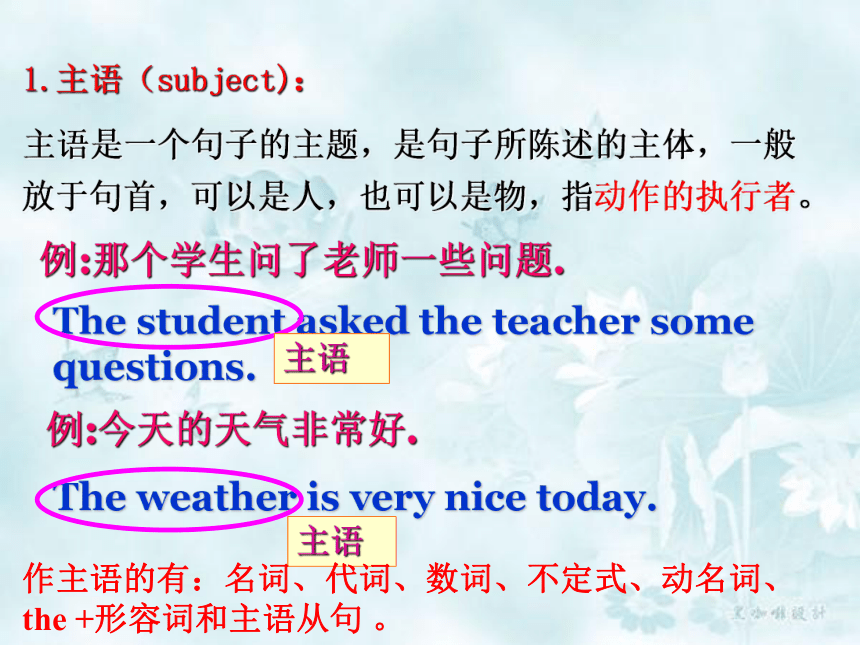
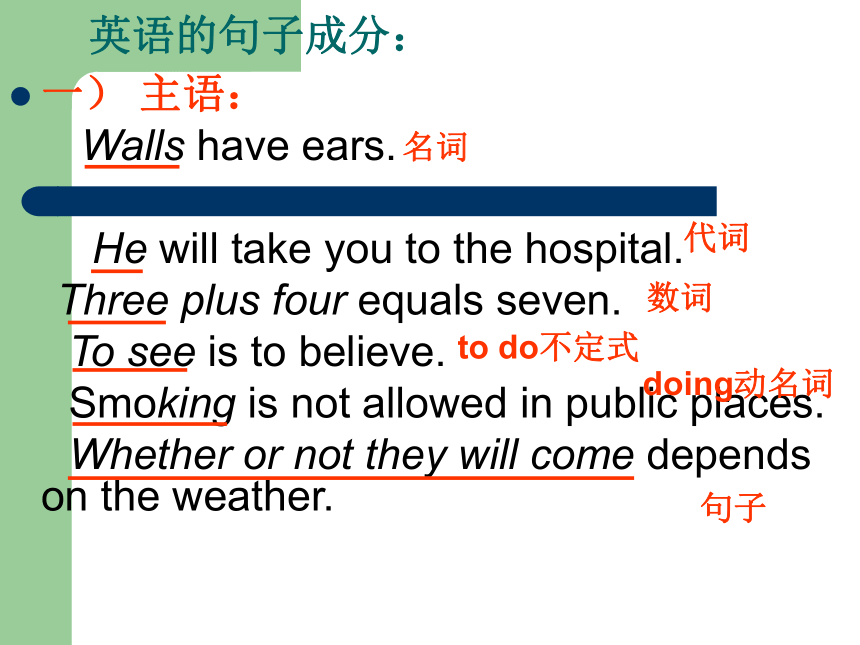

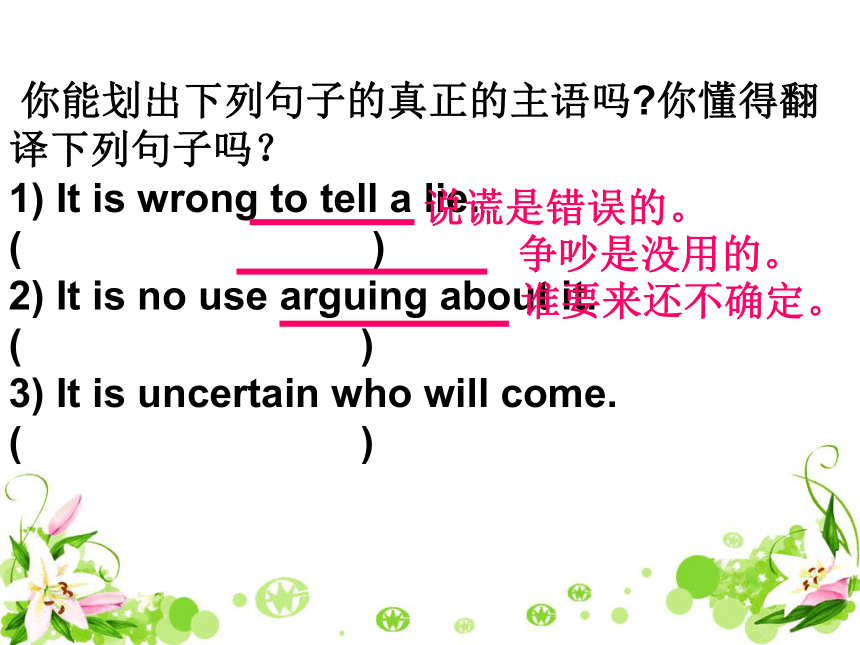



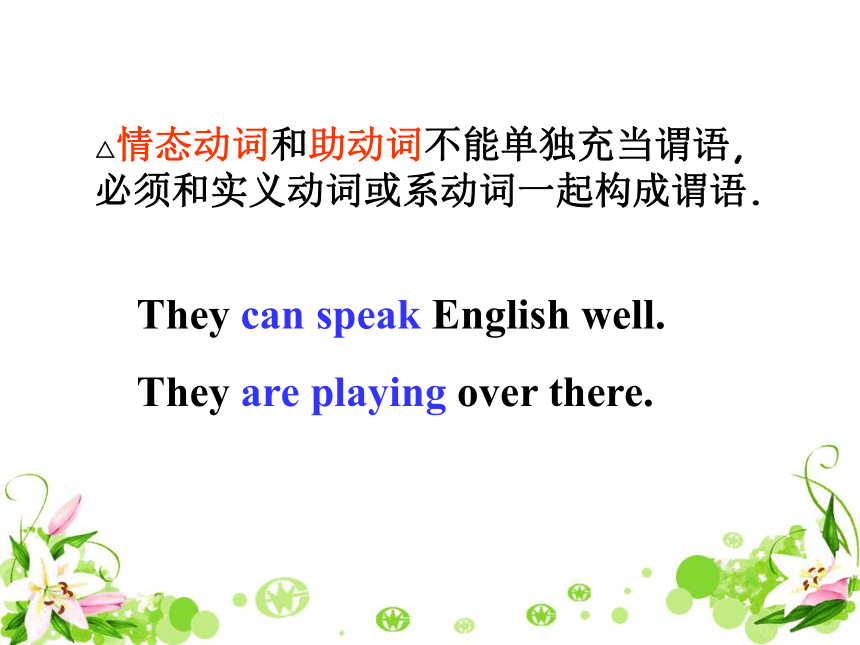
文档简介
(共67张PPT)
Targets
Members of sentences 句子成分
Types of simple sentences简单句的类型
Compound sentences 并列句
Complex sentences 复合句
Compound complex sentences并列复合句
句子成分分析
句子成分
主语 subject
谓语 predicate
宾语 object
表语 predicative
宾补 complement
定语 attribute
状语 adverbial
同位语 appositive
1. I met my best friend Tom at the station yesterday.
↓
主语
↓
谓
语
↓
定语
↓
宾
语
↓
同位语
↓
状
语
1.主语(subject):
主语是一个句子的主题,是句子所陈述的主体,一般
放于句首,可以是人,也可以是物,指动作的执行者。
例:那个学生问了老师一些问题.
The student asked the teacher some
questions.
主语
例:今天的天气非常好.
The weather is very nice today.
主语
作主语的有:名词、代词、数词、不定式、动名词、the +形容词和主语从句 。
英语的句子成分:
一) 主语:
Walls have ears.
He will take you to the hospital.
Three plus four equals seven.
To see is to believe.
Smoking is not allowed in public places.
Whether or not they will come depends on the weather.
名词
代词
数词
to do不定式
doing动名词
句子
当不定式、动名词或从句在某个句子中作主语时,为保持句子结构前后平衡,避免头重脚轻,因此常用it作形式主语置于句首,而将真正的主语放在句尾。此时it只起先行引导作用,本身无词义。
什么情况下用it作形式主语?
你能划出下列句子的真正的主语吗 你懂得翻译下列句子吗?
1) It is wrong to tell a lie. ( ) 2) It is no use arguing about it. ( ) 3) It is uncertain who will come. ( )
说谎是错误的。
争吵是没用的。
谁要来还不确定。
2.谓语(predicate):
谓语一般是指主语的动作或状态,由动词或动词短语充当,位置一般放于主语后面。
例:他工作非常努力.
He works very hard.
谓语
例:今天的天气非常好.
The weather is very nice today.
谓语
例:他在字典里查出了这个单词.
He looked up the word in the dictionary.
谓语
作谓语的有:及物动词或不及物动词短语以及系动词
1. We love China.
2. She seems tired.
3. He can speak English
4. We have finished reading this book.
谓语
谓语:说明主语做什么或怎么样。通常由
______ 充当.动词常分为实义动词,连系动词,情态动词和助动词.
动词
实义动词
连系动词
情态动词
助动词
(V.)
1)状态系动词,用来表示主语状态,只有be (am,is ,are,was,were,been,being)一词
He is a teacher.
2)持续系动词,用来表示主语继续或保持一种状况或态度,主要有keep, remain, stay
He always kept silent at meeting.
他开会时总保持沉默。
系动词
△情态动词和助动词不能单独充当谓语,必须和实义动词或系动词一起构成谓语.
They can speak English well.
They are playing over there.
3)表像系动词,用来表示"看起来像"这一概念,主要有seem, appear, look, 例如:
He looks tired.
He seems (to be) very sad.
4)感官系动词,主要有feel, smell, sound, taste
This flower smells very sweet.
5)变化系动词,表示主语变成什么样,主要有become, grow, turn, fall, get, go, come
He became mad after that.
6)终止系动词,表示主语已终止动作,主要有prove, turn out
The rumor proved false.
这谣言证实有假。
His plan turned out a success.
他的计划终于成功了。
3. 宾语(object):
宾语在句子中主要充当动作的承受者,一般放于及物动词之后。
例:老师把灯关了.
The teacher turned off the lights.
介宾
例:他们将不会伤害我们.
They won’t hurt us.
动宾
例:他在上个星期放弃吸烟了.
He gave up smoking last week.
介宾
宾语
动宾
介宾
宾语分为直接宾语和间接宾语.直接宾语指物,间接宾语指人.
He gave me some books.
↓
间接
宾语
↓
直接
宾语
●Please pass me the book.
●He bought me some flowers.
作宾语的有:名词、代词、数词、不定式、动名词、the +形容词和宾语从句 。
She covered her face with her hands.
We haven't seen her for a long time.
Do you mind opening the window
Give me four please.
He wants to dream a nice dream.
We need know what others are doing.
We should care more about our friends.
She felt it her duty to take good care of them. It作形式宾语,不定式是真正的宾语
名词 n
代词
动名词
代词和数词
to do不定式
句子
介词+名词
4. 表语:(precative)
表语主要用于表述主语的特征,状态,身份等。它位于连系动词后,构成系表结构。
连系动词
例:我是一个老师.
I am a teacher.
表语
例:这种水果尝起来味道很好.
This kind of fruit tastes very delicious.
表语
1.be动词(am, is, are, was, were)
3.感官动词(look, smell, hear, feel…)
+表语
2.表状态变化的动词(get/become/turn/keep/remain/stay)
例:那个女孩变得非常担心.
The girl got worried.
表语
作表语的有:名词、代词、数词、形容词、介词短语、表地点或方位的副词、不定式、动名词、分词和表语从句。
My father is a professor.
Who's that It's me.
Everything here is expensive.
The match became very exciting.
The story of my life may be of help to others.
Three times five is fifteen.
His plan is to seek work in the city.
My first idea was that you should hide your feelings.
名词 n
代词 pron
形容词 adj
adj
介词短语
数词
to do不定式
句子
5. 定语:(attribute)
定语是用来说明名词(代词)的品质与特征的词,形容词通常作定语。
这是一节生动有趣的课.
This is a lively and interesting class.
有一些难题要处理.
There is something difficult to deal with.
前置定语
后置定语
It took him quite a little time to get familiar with the routes ______ to the nest-shaped stadium.
花了很长时间他才熟悉通往鸟巢形的体育馆的路。
leading
定语
He is a clever boy.
They are building a stone bridge.
There are 54 students in our class.
Do you known Betty’s sister
He bought some sleeping pills.
There is a sleeping baby in bed.
His spoken language is good.
I met a friend on my way home.
(形容词)
(名词)
(数词)
(名词的所有格)
(动名词)
(现在分词)
(过去分词)
(副词)
作定语的有:名词、形容词、副词、数词、介词短语、不定式、分词、动名词和定语从句,若是词则多作前置定语,若是短语或定语从句则只能作后置定语。
如the polluted river
the river polluted by chemicals
6. 状语:(adverbial)
状语是修饰动词,形容词,副词以及全句的句子成分;按用途分,可分为时间,地点,原因,结果,目的,条件,让步,程度,方式,伴随状况等。
①表时间:yesterday, today, tomorrow…
Shall we go shopping today or tomorrow
我们是今天还是明天出去买东西啊?
②表地点:in China, at the airport…
I saw a student in the classroom.
我在教室里看见一个学生.
③表原因: because, as, for, since…
他因为生病所以今天没有去上学.
Because he was ill, he didn’t go to school today.
④表结果:to+do, v+ing, 从句
那个男孩从树上掉下来了,头撞到地上了.
The boy fell off the tree, striking his head
against the ground.
⑤表目的:in order to, in order that, for the purpose
为了考入一个更好的学校,我必须更加努力.
In order to get into a better school, I must
study even harder .
⑥表条件: as/so long as, if, unless,
只要努力学习,你就会取得好成绩.
As long as you study hard, you can get a
high mark.
⑦表让步: in spite of, despite, although, though
他虽然不认识我,但却帮了我.
He helped me although he didn’t know me.
⑧表程度: very, enough, to some extent…
那里的风景非常漂亮.
The scenery there is very beautiful.
⑨表方式: like that, as, as if…
不要那样看我.
Don’t look at me like that!
⑩表伴随状况:
老师走进教室,手里拿着一本书.
The teacher came into the classroom,
catching a book in his hand.
with
作状语的有:副词(短语)、介词短语、不定式、分词(短语)、名词短语和状语从句。状语说明时间、地点、原因、目的、结果、条件、让步、程度、方式、伴随情况等。其位置多位于句首或句尾,但表频率或程度的副词应位于句中be动词、情态动词和助动词之后,实义动词之前。地点和时间应按先小后大的顺序。
7. 补语:(complement)
补语
主语补足语:
宾语补足语:
补充说明主语的动作或状态
补充说明宾语的动作或状态
1.我又累又困,就去睡了。
Tired and sleepy, I went to bed.
2.我发现那本书很有趣。
I found that book very interesting.
主语补足语
宾语补足语
你的朋友来上学时心情很不好。
Your friend comes to school very upset.
作补足语的有:名词、形容词、介词短语、不定式和分词(短语)
They elected me captain of the team.
We try to make our country strong.
We found everything in good order there.
I should advise you to get the chance.
I saw him going upstairs.
They found the house broken in.
名词
形容词
介词短语
to do 不定式
现在分词 doing
done 过去分词
宾语和宾语补足语一起构成动词的复合结构
8. 同位语:(appositive)
当两个同一事物的句子成分放在同等位置时,一个句子成分可被用来说明或解释另一个句子成分,前者就叫做后者的同位语。
我们有两个孩子,一男一女.
We have two children, a boy and a girl.
那人是我的老师,他从来都不骑自行车.
The man, my teacher, never rides a bike.
I want this diary itself to be my friend. P 77
句子类型
1、简单句:简单句只有一个主语(或并列主语)和一个谓语动词(或并列谓语动词)。如:My brother and I go to school at half past seven in the morning and come back home at seven in the evening.
2、并列句:并列句由并列连词或分号“;”把两个或两个以上的简单句连在一起构成。如:It is late , so we must hurry.
3、复合句:复合句中含有一个或一个以上的从句。如:If we want to keep fit , we must always remember that prevention is better than cure.
从以上并列句和复合句的例句来看,我们不难看出它们实际上是由几个简单句通过并列连词或从属连词连接起来的。
简单句的五种基本句型
一: S V (主+谓)
二: S V P (主+系+表)
三: S V O (主+谓+宾)
四: S V o O (主+谓+间宾+直宾)
五: S V O C (主+谓+宾+宾补)
二.五种简单句基本句型
主语+谓语+宾语
主语+谓语+间接宾语+直接宾语
主语+谓语+宾语+宾语补足语
动词
系动词
不及物动词
及物动词
主语+系+表语
主语+谓语
基本句型 一:SV(主+谓)
谓语:不及物动词(vi.)没有宾语, 形成主谓结构。
如: We come.
S│V(不及物动词)
1. The sun rose.
2. Who cares
3. What he said does not matter.
4. They talked for half an hour.
5. The pen writes smoothly
动词副词
动词介词
主语可有修饰语-定语,谓语可有修饰语-状语。
如: 1. The red sun rises in the east.
2. So they had to travel by air or boat.
3.We got up early so as to catch the first bus.
4. She sat there alone, reading a novel.
5. He came back when we were eating.
6.Weak buildings will fall down in an earthquake, but strong ones may stay up.
基本句型二:S│V(是系动词)│ P(表语)
1. This is an English-Chinese dictionary.
2. The dinner smells good.
3. He fell in love.
4. Everything looks different.
5. He is growing tall and strong.
6. Our well has gone dry.
7. His face turned red.
连系动词有:be, / seem, appear,(look) /keep, stay, remain, stand(still), lie(awake),/ prove, turn out/ look, feel, sound, smell, taste/ become, grow, get, turn, go(mad, hungry, bad, wrong), come(true), fall(ill,asleep), run(mad,dry)
基本句型 三:S V O (主+谓+宾)
此句型的特点是:谓语动词都是及物动词,必须
跟有一个宾语, 即动作的承受者, 才能使意思完整。
S│V(及物动词)│O(宾语)
1. Who│knows│the answer
2. He │has refused│to help them.
3. He│enjoys│reading.
4. He│said│“Good morning.”
5. He│admits│that he was mistaken.
在此句型中,我们要掌握接动词不定式作宾语和接动名词作宾语的动词。
只接动名词的动词:advise allow avoid admit advocate acknowledge consider deny delay enjoy excuse escape fancy forgive finish imagine, include, keep, miss, mind pardon practise permit risk resist stand stop, leave off, put off, insist on, can’t help, dislike
只接不定式的动词 wish hope manage offer ask pretend decide learn desire agree care choose determine undertake expect threat promise seek
两者都接的动词:
①没有区别attempt,continue,intend,can’t bear, propose
can’t afford, fear, cease
②略有区别like hate love prefer; begin start
③区别很大want, need, require, deserve ;
forget, remember, regret ,try ,mean, go on
基本句型 四:S V o O
(主+谓+间宾+直宾)
有些及物动词可以有两个宾语, e.g.
give/pass/bring/show。这两个宾语通常一个
指人(间接宾语); 一个指物(直接宾语)。
--Give me a cup of tea please.
--Give a cup of tea to me please.
give sb sth= give sth to sb
但若要先说出直接宾语(事物),后说间接宾语(人),则要借助于介词to或for。如:
He brings cookies to me every day.
She made a beautiful dress for me.
用to侧重指动作的方向,表示朝着,向着,对着某人。
用for 侧重指动作的受益者,表示为了某人,替某人。
常跟双宾语的动词有:(需借助to的)bring, give, lend, hand, offer, pass, pay, promise, return, send, show, teach, tell, write, ask等;
(需借助for 的) buy, call, cook, choose, draw, find, get, make, order, sing, save, spare等。
S│V(及物)│o(多指人)│O(多指物)
She ordered herself a new dress.
2. He brought you a dictionary.
3. I showed him my pictures.
4. I told him that the bus was late.
5. He showed me how to run the machine.
基本句型 五:S V O C
(主+谓+宾+宾补)
此句型的特点是: 动词虽然是及物动词, 但是只跟一个
宾语还不能表达完整的意思, 必须加上一个补充成分
来补足宾语, 才能使意思完整。
宾语补足语: 位于宾语之后对宾语作出说明的成分。
可以用作宾语补足语的有名词, 形容词, 不定式,
动名词, 分词, 介词短语等。
We should keep the plants in the shade.
1)The villagers didn’t allow them to do this.
主语 谓语 宾语 宾语补足语
2)I will keep the box in the shade.
3)We found him a very good pupil.
4)She let me stay in the company.
用 it 做形式宾语,而将真正的宾语放到宾语补足语的后面,以使句子结构平衡,是英语常用的句型结构方式。即:主语+谓语+it+宾补+真正宾语。如:
I found it very pleasant to be with your family.
巩固练习:
1.我们叫她Alice.
2.我们大家都认为他是诚实的。
3.他们已经把小偷释放了。
4.我要你把真相告诉我。
5 .卫兵命令我们立即离开。
6. 每天早晨我们都听到他大声朗读英语。
7.他每个月理一次发
8.我们不会让她在晚上外出的。
We call her Alice.
All of us considered him honest.
They have set the thief free.
I want you to tell me the truth.
The guards ordered us to leave at once.
Every morning we hear him read English aloud.
He has his hair cut every month.
We won’t let her go out at night.
9.那可怕的声音把孩子们吓坏了
10.她正在听人家讲故事。
11.我从来没看见这个字这样用过。
12.他感到很难跟你交谈。
13.我认为有可能用另一种方法解题。
14.学校定了一条规则,开始上课时学生要起立。
The terrible sound made the children frightened.
She is listening to someone telling stories.
I have never seen the word used that way before.
He felt it very difficult to talk with you.
I consider it possible to work out the problem
in another way.
The school made it a rule that the students
should stand up when class begins.
There be 句型
说明: 此句型是由“there+be+主语+状语”构成,用以表达存在关系可以称“……有……”。 它其实是倒装的一种情况,主语位于谓语动词 be 之后,there 仅为引导词,并无实际语意。
此句型有时不用be动词,而用 live, stand, come, go, lie, remain, exist, arrive等。如:
There stands a hill in the middle of the park.
Once upon a time there lived an old king in the town.
Be 与其后的主语在人称和数量上一致,有时态和情态变化。如:
现在有 there is/are …
过去有 there was/were…
将来有 there will be…;there is /are going to be...
现在已经有 there has/have been…
可能有 there might be...
肯定有 there must be …/there must have been...
过去曾经有 there used to be …
似乎有 there seems/seem/seemed to be …
碰巧有 there happen/happens/happened to be …
巩固练习:
1.这个村子过去只有一口井。
2.客人当中有两名美国人和两名法国人。
3.气象员说下午将有大风。
4.灯亮着,办公室里肯定有人。
5.战前这儿曾有一家电影院.
There was only a well in the village.
Among the guests there were two Americans and two Frenchmen.
The weatherman says there’ll be a strong wind in the afternoon.
The light is on. There must be someone in the office.
There used to be a cinema here before the war.
巩固练习:
6.恰好那时房里没人。
7.从前,在海边的一个村子里住着一位老渔夫。
8.公共汽车来了。
9.就只剩下二十八美元了。
10.铃响了。
There happened to be nobody in the room.
Once, there lived an old fisherman in a village by the sea.
There comes the bus.
There remained only twenty –eight dollars.
There goes the bell.
Exercises
(一) 挑出下列句中的宾语
① My brother hasn't done his homework.
② People all over the world speak English.
④ How many new words did you learn last class
⑤ Some of the students in the school want
to go swimming, how about you
⑥ The old man sitting at the gate said he was ill.
(二) 挑出下列句中的表语
-- The old man was feeling very tired.
-- The leaves have turned yellow.
-- Soon They all became interested in the subject.
(三) 挑出下列句中的定语
1. What is your given name
2. I am afraid some people forgot to sweep the floor.
3. The man downstairs was trying to sleep.
4. I am waiting for the sound of the other shoe!
(四) 挑出下列句中的宾语补足语
① She likes the children to read newspapers and books in the reading-room.
② He asked her to take the boy out of school.
③ She found it difficult to do the work.
④ They call me Lily sometimes.
⑤ I saw Mr Wang get on the bus.
(五) 挑出下列句中的状语
① There was a big smile on her face.
② Every night he heard the noise upstairs.
③ He began to learn English when he was eleven.
④ The man on the motorbike was traveling too fast.
⑤ With the medicine box under her arm, Miss Li hurried off.
⑥ She loves the library because she loves books.
⑦ I am afraid that if you've lost it, you must pay for it.
⑧ The students followed Uncle Wang to see the other machine.
划分句子成分
You will tell your friend that you’ve got to school.
But as the moon gave far too much light, I didn’t dare open a window.
3. Another time five months ago, I happened to be upstairs at dusk when the window was open.
4. The dark, rainy evening, the wind, the thundering clouds held me entirely in their power.
1.You will tell (your) friend that you’ve got to school.
2. But [as the moon gave far too much light], I didn’t
dare open a window.
3. [Another time five months ago], I happened to be
Upstairs [at dusk] (when the window was open).
4. The (dark, rainy) evening, the wind, the thundering
Clouds held me [entirely] in their power.
主语
谓语
间宾
定语
直接宾语
原因状语
主语
谓语
宾语
状语
A Lebanese who had left the country for Syria during the conflict between Israel and Hizbollah returns with her family following the ceasefire, at the Lebanon-Syria border in Magdel Anjar August 14, 2006.
长难句分析
Even though there may be a tendency in some rare families to live extraordinarily long, the genetic influence that emerged from the studies of twins was significantly less than much of the public and many scientists think it is.
S+V+P
Josephine Tesauro, left, active and healthy at 92, is part of a study trying to determine why some people age better than others, even when they are closely related.
First put forward by the French mathematician Pierre de Format in the seventeenth century, the theorem had baffled and beaten the finest mathematical minds, including a French woman scientist who made a major advance in working out the problem, and who had to dress like a man in order to be able to study at the Ecolab polytechnique. (NMET2003.C篇)
这个定理,先是由十七世纪法国数学家皮尔法特提出,曾使一批杰出的数学大师为难,包括一位法国女科学家,她在解决这个难题方面取得了重大的进展,她曾女扮男装为了能够在伊科尔理工学院学习。
简析:夹杂过去分词短语,现在分词短语,动名词及两个定语从句。
1.They guess that racial differences in which dairy products are usually consumed,or in eating habits—having small amounts of dairy products throughout the day,for instance,rather than a single large serving—may help explain the finding.
2.How could we possibly think that keeping animals in cagesin unnatural environments—mostly for
entertainment purposes
—is fair and respectful
3.Human beings have agreed, in the course of centuries of
mutual dependency,to let the various noises that they can produce with their lungs,throats,tongues,teeth,and lips systematically stand for certain happenings in their nervous systems.
Homework 长难句分析
4.Just as social positions can be symbolized by feathers worn on the head, by gold on the watch chain, or by a thousand other things according to the culture we live in, so the fact of being hungry can be symbolized by a thousand different noises according to the culture we live in.
5.The fact that most of these young people have gone to Europeanized or Americanized societies makes it unlikely that they will hold as tightly to the value of duty as they would have if they had not left their countries.
翻译以下句子
1.你的故事听起来很有趣。
You story sounds very interesting.
2.我感到有一点累。
I felt a bit tired.
3.我妹妹是在农村长大的。
My younger sister grew up in the country.
4.这家医院创建于1950年。
This hospital was set up in 1950.
5.他因为车子开得太快而违反了交通规则。
He broke the traffic rule because he drove his car too fast.
6、他拿出一瓶啤酒,很快将其喝光。
He brought out a bottle of beer and drank it up quickly.
7、顺便问一下,她把钱付给你了吗?
By the way, has she paid you the money
8、下学期谁教你们生物?
Who will teach you biology next term
9、他总是把他的卧室收拾得干干净净
He always keeps his bedroom clean.
10、什么促使你这样想的?
What made you think so
Targets
Members of sentences 句子成分
Types of simple sentences简单句的类型
Compound sentences 并列句
Complex sentences 复合句
Compound complex sentences并列复合句
句子成分分析
句子成分
主语 subject
谓语 predicate
宾语 object
表语 predicative
宾补 complement
定语 attribute
状语 adverbial
同位语 appositive
1. I met my best friend Tom at the station yesterday.
↓
主语
↓
谓
语
↓
定语
↓
宾
语
↓
同位语
↓
状
语
1.主语(subject):
主语是一个句子的主题,是句子所陈述的主体,一般
放于句首,可以是人,也可以是物,指动作的执行者。
例:那个学生问了老师一些问题.
The student asked the teacher some
questions.
主语
例:今天的天气非常好.
The weather is very nice today.
主语
作主语的有:名词、代词、数词、不定式、动名词、the +形容词和主语从句 。
英语的句子成分:
一) 主语:
Walls have ears.
He will take you to the hospital.
Three plus four equals seven.
To see is to believe.
Smoking is not allowed in public places.
Whether or not they will come depends on the weather.
名词
代词
数词
to do不定式
doing动名词
句子
当不定式、动名词或从句在某个句子中作主语时,为保持句子结构前后平衡,避免头重脚轻,因此常用it作形式主语置于句首,而将真正的主语放在句尾。此时it只起先行引导作用,本身无词义。
什么情况下用it作形式主语?
你能划出下列句子的真正的主语吗 你懂得翻译下列句子吗?
1) It is wrong to tell a lie. ( ) 2) It is no use arguing about it. ( ) 3) It is uncertain who will come. ( )
说谎是错误的。
争吵是没用的。
谁要来还不确定。
2.谓语(predicate):
谓语一般是指主语的动作或状态,由动词或动词短语充当,位置一般放于主语后面。
例:他工作非常努力.
He works very hard.
谓语
例:今天的天气非常好.
The weather is very nice today.
谓语
例:他在字典里查出了这个单词.
He looked up the word in the dictionary.
谓语
作谓语的有:及物动词或不及物动词短语以及系动词
1. We love China.
2. She seems tired.
3. He can speak English
4. We have finished reading this book.
谓语
谓语:说明主语做什么或怎么样。通常由
______ 充当.动词常分为实义动词,连系动词,情态动词和助动词.
动词
实义动词
连系动词
情态动词
助动词
(V.)
1)状态系动词,用来表示主语状态,只有be (am,is ,are,was,were,been,being)一词
He is a teacher.
2)持续系动词,用来表示主语继续或保持一种状况或态度,主要有keep, remain, stay
He always kept silent at meeting.
他开会时总保持沉默。
系动词
△情态动词和助动词不能单独充当谓语,必须和实义动词或系动词一起构成谓语.
They can speak English well.
They are playing over there.
3)表像系动词,用来表示"看起来像"这一概念,主要有seem, appear, look, 例如:
He looks tired.
He seems (to be) very sad.
4)感官系动词,主要有feel, smell, sound, taste
This flower smells very sweet.
5)变化系动词,表示主语变成什么样,主要有become, grow, turn, fall, get, go, come
He became mad after that.
6)终止系动词,表示主语已终止动作,主要有prove, turn out
The rumor proved false.
这谣言证实有假。
His plan turned out a success.
他的计划终于成功了。
3. 宾语(object):
宾语在句子中主要充当动作的承受者,一般放于及物动词之后。
例:老师把灯关了.
The teacher turned off the lights.
介宾
例:他们将不会伤害我们.
They won’t hurt us.
动宾
例:他在上个星期放弃吸烟了.
He gave up smoking last week.
介宾
宾语
动宾
介宾
宾语分为直接宾语和间接宾语.直接宾语指物,间接宾语指人.
He gave me some books.
↓
间接
宾语
↓
直接
宾语
●Please pass me the book.
●He bought me some flowers.
作宾语的有:名词、代词、数词、不定式、动名词、the +形容词和宾语从句 。
She covered her face with her hands.
We haven't seen her for a long time.
Do you mind opening the window
Give me four please.
He wants to dream a nice dream.
We need know what others are doing.
We should care more about our friends.
She felt it her duty to take good care of them. It作形式宾语,不定式是真正的宾语
名词 n
代词
动名词
代词和数词
to do不定式
句子
介词+名词
4. 表语:(precative)
表语主要用于表述主语的特征,状态,身份等。它位于连系动词后,构成系表结构。
连系动词
例:我是一个老师.
I am a teacher.
表语
例:这种水果尝起来味道很好.
This kind of fruit tastes very delicious.
表语
1.be动词(am, is, are, was, were)
3.感官动词(look, smell, hear, feel…)
+表语
2.表状态变化的动词(get/become/turn/keep/remain/stay)
例:那个女孩变得非常担心.
The girl got worried.
表语
作表语的有:名词、代词、数词、形容词、介词短语、表地点或方位的副词、不定式、动名词、分词和表语从句。
My father is a professor.
Who's that It's me.
Everything here is expensive.
The match became very exciting.
The story of my life may be of help to others.
Three times five is fifteen.
His plan is to seek work in the city.
My first idea was that you should hide your feelings.
名词 n
代词 pron
形容词 adj
adj
介词短语
数词
to do不定式
句子
5. 定语:(attribute)
定语是用来说明名词(代词)的品质与特征的词,形容词通常作定语。
这是一节生动有趣的课.
This is a lively and interesting class.
有一些难题要处理.
There is something difficult to deal with.
前置定语
后置定语
It took him quite a little time to get familiar with the routes ______ to the nest-shaped stadium.
花了很长时间他才熟悉通往鸟巢形的体育馆的路。
leading
定语
He is a clever boy.
They are building a stone bridge.
There are 54 students in our class.
Do you known Betty’s sister
He bought some sleeping pills.
There is a sleeping baby in bed.
His spoken language is good.
I met a friend on my way home.
(形容词)
(名词)
(数词)
(名词的所有格)
(动名词)
(现在分词)
(过去分词)
(副词)
作定语的有:名词、形容词、副词、数词、介词短语、不定式、分词、动名词和定语从句,若是词则多作前置定语,若是短语或定语从句则只能作后置定语。
如the polluted river
the river polluted by chemicals
6. 状语:(adverbial)
状语是修饰动词,形容词,副词以及全句的句子成分;按用途分,可分为时间,地点,原因,结果,目的,条件,让步,程度,方式,伴随状况等。
①表时间:yesterday, today, tomorrow…
Shall we go shopping today or tomorrow
我们是今天还是明天出去买东西啊?
②表地点:in China, at the airport…
I saw a student in the classroom.
我在教室里看见一个学生.
③表原因: because, as, for, since…
他因为生病所以今天没有去上学.
Because he was ill, he didn’t go to school today.
④表结果:to+do, v+ing, 从句
那个男孩从树上掉下来了,头撞到地上了.
The boy fell off the tree, striking his head
against the ground.
⑤表目的:in order to, in order that, for the purpose
为了考入一个更好的学校,我必须更加努力.
In order to get into a better school, I must
study even harder .
⑥表条件: as/so long as, if, unless,
只要努力学习,你就会取得好成绩.
As long as you study hard, you can get a
high mark.
⑦表让步: in spite of, despite, although, though
他虽然不认识我,但却帮了我.
He helped me although he didn’t know me.
⑧表程度: very, enough, to some extent…
那里的风景非常漂亮.
The scenery there is very beautiful.
⑨表方式: like that, as, as if…
不要那样看我.
Don’t look at me like that!
⑩表伴随状况:
老师走进教室,手里拿着一本书.
The teacher came into the classroom,
catching a book in his hand.
with
作状语的有:副词(短语)、介词短语、不定式、分词(短语)、名词短语和状语从句。状语说明时间、地点、原因、目的、结果、条件、让步、程度、方式、伴随情况等。其位置多位于句首或句尾,但表频率或程度的副词应位于句中be动词、情态动词和助动词之后,实义动词之前。地点和时间应按先小后大的顺序。
7. 补语:(complement)
补语
主语补足语:
宾语补足语:
补充说明主语的动作或状态
补充说明宾语的动作或状态
1.我又累又困,就去睡了。
Tired and sleepy, I went to bed.
2.我发现那本书很有趣。
I found that book very interesting.
主语补足语
宾语补足语
你的朋友来上学时心情很不好。
Your friend comes to school very upset.
作补足语的有:名词、形容词、介词短语、不定式和分词(短语)
They elected me captain of the team.
We try to make our country strong.
We found everything in good order there.
I should advise you to get the chance.
I saw him going upstairs.
They found the house broken in.
名词
形容词
介词短语
to do 不定式
现在分词 doing
done 过去分词
宾语和宾语补足语一起构成动词的复合结构
8. 同位语:(appositive)
当两个同一事物的句子成分放在同等位置时,一个句子成分可被用来说明或解释另一个句子成分,前者就叫做后者的同位语。
我们有两个孩子,一男一女.
We have two children, a boy and a girl.
那人是我的老师,他从来都不骑自行车.
The man, my teacher, never rides a bike.
I want this diary itself to be my friend. P 77
句子类型
1、简单句:简单句只有一个主语(或并列主语)和一个谓语动词(或并列谓语动词)。如:My brother and I go to school at half past seven in the morning and come back home at seven in the evening.
2、并列句:并列句由并列连词或分号“;”把两个或两个以上的简单句连在一起构成。如:It is late , so we must hurry.
3、复合句:复合句中含有一个或一个以上的从句。如:If we want to keep fit , we must always remember that prevention is better than cure.
从以上并列句和复合句的例句来看,我们不难看出它们实际上是由几个简单句通过并列连词或从属连词连接起来的。
简单句的五种基本句型
一: S V (主+谓)
二: S V P (主+系+表)
三: S V O (主+谓+宾)
四: S V o O (主+谓+间宾+直宾)
五: S V O C (主+谓+宾+宾补)
二.五种简单句基本句型
主语+谓语+宾语
主语+谓语+间接宾语+直接宾语
主语+谓语+宾语+宾语补足语
动词
系动词
不及物动词
及物动词
主语+系+表语
主语+谓语
基本句型 一:SV(主+谓)
谓语:不及物动词(vi.)没有宾语, 形成主谓结构。
如: We come.
S│V(不及物动词)
1. The sun rose.
2. Who cares
3. What he said does not matter.
4. They talked for half an hour.
5. The pen writes smoothly
动词副词
动词介词
主语可有修饰语-定语,谓语可有修饰语-状语。
如: 1. The red sun rises in the east.
2. So they had to travel by air or boat.
3.We got up early so as to catch the first bus.
4. She sat there alone, reading a novel.
5. He came back when we were eating.
6.Weak buildings will fall down in an earthquake, but strong ones may stay up.
基本句型二:S│V(是系动词)│ P(表语)
1. This is an English-Chinese dictionary.
2. The dinner smells good.
3. He fell in love.
4. Everything looks different.
5. He is growing tall and strong.
6. Our well has gone dry.
7. His face turned red.
连系动词有:be, / seem, appear,(look) /keep, stay, remain, stand(still), lie(awake),/ prove, turn out/ look, feel, sound, smell, taste/ become, grow, get, turn, go(mad, hungry, bad, wrong), come(true), fall(ill,asleep), run(mad,dry)
基本句型 三:S V O (主+谓+宾)
此句型的特点是:谓语动词都是及物动词,必须
跟有一个宾语, 即动作的承受者, 才能使意思完整。
S│V(及物动词)│O(宾语)
1. Who│knows│the answer
2. He │has refused│to help them.
3. He│enjoys│reading.
4. He│said│“Good morning.”
5. He│admits│that he was mistaken.
在此句型中,我们要掌握接动词不定式作宾语和接动名词作宾语的动词。
只接动名词的动词:advise allow avoid admit advocate acknowledge consider deny delay enjoy excuse escape fancy forgive finish imagine, include, keep, miss, mind pardon practise permit risk resist stand stop, leave off, put off, insist on, can’t help, dislike
只接不定式的动词 wish hope manage offer ask pretend decide learn desire agree care choose determine undertake expect threat promise seek
两者都接的动词:
①没有区别attempt,continue,intend,can’t bear, propose
can’t afford, fear, cease
②略有区别like hate love prefer; begin start
③区别很大want, need, require, deserve ;
forget, remember, regret ,try ,mean, go on
基本句型 四:S V o O
(主+谓+间宾+直宾)
有些及物动词可以有两个宾语, e.g.
give/pass/bring/show。这两个宾语通常一个
指人(间接宾语); 一个指物(直接宾语)。
--Give me a cup of tea please.
--Give a cup of tea to me please.
give sb sth= give sth to sb
但若要先说出直接宾语(事物),后说间接宾语(人),则要借助于介词to或for。如:
He brings cookies to me every day.
She made a beautiful dress for me.
用to侧重指动作的方向,表示朝着,向着,对着某人。
用for 侧重指动作的受益者,表示为了某人,替某人。
常跟双宾语的动词有:(需借助to的)bring, give, lend, hand, offer, pass, pay, promise, return, send, show, teach, tell, write, ask等;
(需借助for 的) buy, call, cook, choose, draw, find, get, make, order, sing, save, spare等。
S│V(及物)│o(多指人)│O(多指物)
She ordered herself a new dress.
2. He brought you a dictionary.
3. I showed him my pictures.
4. I told him that the bus was late.
5. He showed me how to run the machine.
基本句型 五:S V O C
(主+谓+宾+宾补)
此句型的特点是: 动词虽然是及物动词, 但是只跟一个
宾语还不能表达完整的意思, 必须加上一个补充成分
来补足宾语, 才能使意思完整。
宾语补足语: 位于宾语之后对宾语作出说明的成分。
可以用作宾语补足语的有名词, 形容词, 不定式,
动名词, 分词, 介词短语等。
We should keep the plants in the shade.
1)The villagers didn’t allow them to do this.
主语 谓语 宾语 宾语补足语
2)I will keep the box in the shade.
3)We found him a very good pupil.
4)She let me stay in the company.
用 it 做形式宾语,而将真正的宾语放到宾语补足语的后面,以使句子结构平衡,是英语常用的句型结构方式。即:主语+谓语+it+宾补+真正宾语。如:
I found it very pleasant to be with your family.
巩固练习:
1.我们叫她Alice.
2.我们大家都认为他是诚实的。
3.他们已经把小偷释放了。
4.我要你把真相告诉我。
5 .卫兵命令我们立即离开。
6. 每天早晨我们都听到他大声朗读英语。
7.他每个月理一次发
8.我们不会让她在晚上外出的。
We call her Alice.
All of us considered him honest.
They have set the thief free.
I want you to tell me the truth.
The guards ordered us to leave at once.
Every morning we hear him read English aloud.
He has his hair cut every month.
We won’t let her go out at night.
9.那可怕的声音把孩子们吓坏了
10.她正在听人家讲故事。
11.我从来没看见这个字这样用过。
12.他感到很难跟你交谈。
13.我认为有可能用另一种方法解题。
14.学校定了一条规则,开始上课时学生要起立。
The terrible sound made the children frightened.
She is listening to someone telling stories.
I have never seen the word used that way before.
He felt it very difficult to talk with you.
I consider it possible to work out the problem
in another way.
The school made it a rule that the students
should stand up when class begins.
There be 句型
说明: 此句型是由“there+be+主语+状语”构成,用以表达存在关系可以称“……有……”。 它其实是倒装的一种情况,主语位于谓语动词 be 之后,there 仅为引导词,并无实际语意。
此句型有时不用be动词,而用 live, stand, come, go, lie, remain, exist, arrive等。如:
There stands a hill in the middle of the park.
Once upon a time there lived an old king in the town.
Be 与其后的主语在人称和数量上一致,有时态和情态变化。如:
现在有 there is/are …
过去有 there was/were…
将来有 there will be…;there is /are going to be...
现在已经有 there has/have been…
可能有 there might be...
肯定有 there must be …/there must have been...
过去曾经有 there used to be …
似乎有 there seems/seem/seemed to be …
碰巧有 there happen/happens/happened to be …
巩固练习:
1.这个村子过去只有一口井。
2.客人当中有两名美国人和两名法国人。
3.气象员说下午将有大风。
4.灯亮着,办公室里肯定有人。
5.战前这儿曾有一家电影院.
There was only a well in the village.
Among the guests there were two Americans and two Frenchmen.
The weatherman says there’ll be a strong wind in the afternoon.
The light is on. There must be someone in the office.
There used to be a cinema here before the war.
巩固练习:
6.恰好那时房里没人。
7.从前,在海边的一个村子里住着一位老渔夫。
8.公共汽车来了。
9.就只剩下二十八美元了。
10.铃响了。
There happened to be nobody in the room.
Once, there lived an old fisherman in a village by the sea.
There comes the bus.
There remained only twenty –eight dollars.
There goes the bell.
Exercises
(一) 挑出下列句中的宾语
① My brother hasn't done his homework.
② People all over the world speak English.
④ How many new words did you learn last class
⑤ Some of the students in the school want
to go swimming, how about you
⑥ The old man sitting at the gate said he was ill.
(二) 挑出下列句中的表语
-- The old man was feeling very tired.
-- The leaves have turned yellow.
-- Soon They all became interested in the subject.
(三) 挑出下列句中的定语
1. What is your given name
2. I am afraid some people forgot to sweep the floor.
3. The man downstairs was trying to sleep.
4. I am waiting for the sound of the other shoe!
(四) 挑出下列句中的宾语补足语
① She likes the children to read newspapers and books in the reading-room.
② He asked her to take the boy out of school.
③ She found it difficult to do the work.
④ They call me Lily sometimes.
⑤ I saw Mr Wang get on the bus.
(五) 挑出下列句中的状语
① There was a big smile on her face.
② Every night he heard the noise upstairs.
③ He began to learn English when he was eleven.
④ The man on the motorbike was traveling too fast.
⑤ With the medicine box under her arm, Miss Li hurried off.
⑥ She loves the library because she loves books.
⑦ I am afraid that if you've lost it, you must pay for it.
⑧ The students followed Uncle Wang to see the other machine.
划分句子成分
You will tell your friend that you’ve got to school.
But as the moon gave far too much light, I didn’t dare open a window.
3. Another time five months ago, I happened to be upstairs at dusk when the window was open.
4. The dark, rainy evening, the wind, the thundering clouds held me entirely in their power.
1.You will tell (your) friend that you’ve got to school.
2. But [as the moon gave far too much light], I didn’t
dare open a window.
3. [Another time five months ago], I happened to be
Upstairs [at dusk] (when the window was open).
4. The (dark, rainy) evening, the wind, the thundering
Clouds held me [entirely] in their power.
主语
谓语
间宾
定语
直接宾语
原因状语
主语
谓语
宾语
状语
A Lebanese who had left the country for Syria during the conflict between Israel and Hizbollah returns with her family following the ceasefire, at the Lebanon-Syria border in Magdel Anjar August 14, 2006.
长难句分析
Even though there may be a tendency in some rare families to live extraordinarily long, the genetic influence that emerged from the studies of twins was significantly less than much of the public and many scientists think it is.
S+V+P
Josephine Tesauro, left, active and healthy at 92, is part of a study trying to determine why some people age better than others, even when they are closely related.
First put forward by the French mathematician Pierre de Format in the seventeenth century, the theorem had baffled and beaten the finest mathematical minds, including a French woman scientist who made a major advance in working out the problem, and who had to dress like a man in order to be able to study at the Ecolab polytechnique. (NMET2003.C篇)
这个定理,先是由十七世纪法国数学家皮尔法特提出,曾使一批杰出的数学大师为难,包括一位法国女科学家,她在解决这个难题方面取得了重大的进展,她曾女扮男装为了能够在伊科尔理工学院学习。
简析:夹杂过去分词短语,现在分词短语,动名词及两个定语从句。
1.They guess that racial differences in which dairy products are usually consumed,or in eating habits—having small amounts of dairy products throughout the day,for instance,rather than a single large serving—may help explain the finding.
2.How could we possibly think that keeping animals in cagesin unnatural environments—mostly for
entertainment purposes
—is fair and respectful
3.Human beings have agreed, in the course of centuries of
mutual dependency,to let the various noises that they can produce with their lungs,throats,tongues,teeth,and lips systematically stand for certain happenings in their nervous systems.
Homework 长难句分析
4.Just as social positions can be symbolized by feathers worn on the head, by gold on the watch chain, or by a thousand other things according to the culture we live in, so the fact of being hungry can be symbolized by a thousand different noises according to the culture we live in.
5.The fact that most of these young people have gone to Europeanized or Americanized societies makes it unlikely that they will hold as tightly to the value of duty as they would have if they had not left their countries.
翻译以下句子
1.你的故事听起来很有趣。
You story sounds very interesting.
2.我感到有一点累。
I felt a bit tired.
3.我妹妹是在农村长大的。
My younger sister grew up in the country.
4.这家医院创建于1950年。
This hospital was set up in 1950.
5.他因为车子开得太快而违反了交通规则。
He broke the traffic rule because he drove his car too fast.
6、他拿出一瓶啤酒,很快将其喝光。
He brought out a bottle of beer and drank it up quickly.
7、顺便问一下,她把钱付给你了吗?
By the way, has she paid you the money
8、下学期谁教你们生物?
Who will teach you biology next term
9、他总是把他的卧室收拾得干干净净
He always keeps his bedroom clean.
10、什么促使你这样想的?
What made you think so
同课章节目录
